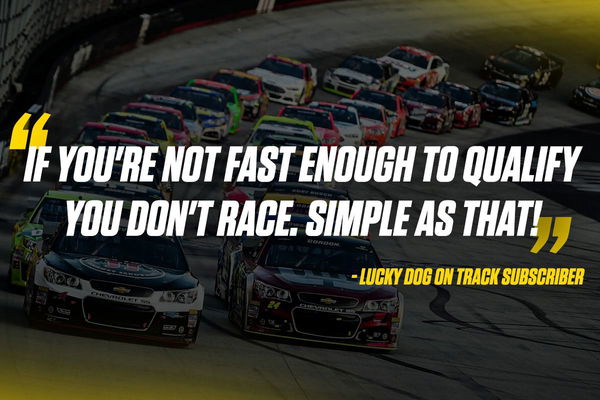
Imago
NASCAR, Motorsport, USA Grant Park 165 Jul 6, 2025 Chicago, Illinois, USA A general view as fans watch the Grant Park 165 at Chicago Street Race. Chicago Chicago Street Race Illinois USA, EDITORIAL USE ONLY PUBLICATIONxINxGERxSUIxAUTxONLY Copyright: xDanielxBartelx 20250706_jcd_bd7_0074

Imago
NASCAR, Motorsport, USA Grant Park 165 Jul 6, 2025 Chicago, Illinois, USA A general view as fans watch the Grant Park 165 at Chicago Street Race. Chicago Chicago Street Race Illinois USA, EDITORIAL USE ONLY PUBLICATIONxINxGERxSUIxAUTxONLY Copyright: xDanielxBartelx 20250706_jcd_bd7_0074
It all started in 2016. When NASCAR introduced the charter system, the objective for this radical decision was a simple one. The sanctioning body wanted to create stability for teams by guaranteeing starting spots in races. The idea seemed to make sense, at least on paper, as it would be a way to ensure financial security and attract long-term investments in the sport. However, the reality was starkly different, as many long-term fans felt it destroyed the merit-based foundation the sport was built on. Sidelining the very audience that had built the sport from the ground up.
Watch What’s Trending Now!
The frustration has been there for all to see. From social media to the grandstands on racedays, a significant section of the fanbase isn’t on board with the charter system. One Lucky Dog on Track subscriber put it bluntly, saying, “They ought to eliminate the charters altogether. If you qualify, you race, if you don’t you work harder next week.” That has been the soul of the sport right from day one. What made NASCAR a fan favorite was that no matter the size of a team’s budget or the strength of their sponsors, qualifiers put every team and driver on a level playing field. Drivers had to earn the right to compete in races, but that’s no longer the reality.
ADVERTISEMENT
Has the charter system really helped the sport progress?
Thanks to the charter system, there are 36 guaranteed positions, which means only a handful of ‘open’ teams can make it to a Cup Series race. For many, such a ‘system’ means the competitive spirit that the sport was built on has been compromised. And that has caused a disconnect with fans, which is now showing visible consequences. “Look at the grandstands they are empty no fans the folks who run things don’t know what they are doing,” said another LDOT subscriber. The attendance on tracks has steadily declined over the years, with fans making it known that their faith in the sanctioning body is at an all-time low.
To many stock car racing enthusiasts, the charter system feels like a closed-door policy that benefits the owners more than the drivers or fans. Everyone wants to see an underdog story, an unknown entity competing at the highest level and securing a win. But with guaranteed spots every weekend, the chances of ‘Cinderella Stories’ are few and far between. Back in the good ol’ days, underfunded teams could scrape together enough resources to qualify for races and shock fans with a strong run at crown-jewel races like the Daytona 500. That is a lot more unlikely now with the charter system.
One of the most common complaints by fans is that NASCAR has become more about business than racing. That’s why a frustrated fan wrote to us, saying, “The whole thing is rigged! NASCAR manipulation during the races is the worst thing but everything they do is to control the money, and they sure do make sure they hold all the cards! Like little kids playing baseball in their backyard. They own the bat and balls, and just because you have a mitt doesn’t mean you get to play. They are the bully in the room and it’s their way or the highway, and whoever doesn’t comply, doesn’t get to play.”
ADVERTISEMENT

ADVERTISEMENT
The ongoing antitrust lawsuit says it all. NASCAR decides the terms, and teams are forced to put pen to paper or risk losing their charters worth millions. 23XI Racing and Front Row Motorsports, who took NASCAR to court, are already competing as ‘open’ teams, spending above and beyond to race in the Cup Series every week. For a sport that took pride in underdog stories once upon a time, the charter system is proving that it has become a closed market where being wealthy and maintaining the status quo is the only way to thrive.
If anything, the charters have pushed out team owners and NASCAR enthusiasts away from the sport. Chip Ganassi, who still runs an active team operation in IndyCar pulled the plug on his NASCAR project, and so did Tony Stewart. It is good to see new players looking to invest in modern NASCAR. But what about the old guard, ones who helped the sport experience the highs of the 90s and early 2000s?
ADVERTISEMENT
Even fans who are not entirely against the charter system can see flaws in how the sport is operating at the moment. One fan wrote, “I think the charter system hurts the teams. The teams are investing millions of dollars into a non-tangible thing. Now, if NASCAR made the charters permanent for the current existing teams then it would be more worth it. Plus, if a current team wanted to sell a permanent charter to a new team then there would be that option.”
Top Stories
NASCAR’s Clash Now at the Mercy of State Officials Amid Dire Travel Advisory

Exclusive: Mark Martin – It’s Been a Difficult Off-Season, but 2026 Promises New Hope for NASCAR

“I Don’t Fail”: France Family Rival Issues Defiant Warning as Critics Doubt Over Aggressive Strategy to Beat NASCAR

Cup Star Comes to NASCAR’s Defense as O’Reilly Opens the Doors to “Busch Whacking” Young Kids

NTSB Exposes Alarming Chain of Errors in Greg Biffle’s Fatal Plane Crash

What is the sensible solution to this charter problem?
Ultimately, it all comes down to NASCAR. Despite teams buying charters for millions, they’re not permanent. The sanctioning body has the power to revoke them, bringing uncertainty for team owners who are simply adapting to a system that was designed to provide ‘stability’. The lack of security for their investment leaves teams and fans wondering what or who exactly the charter system is designed to protect. The obvious answer is NASCAR, and it’s evident that the system is designed to maintain control.
ADVERTISEMENT
Many long-term fans look back on the good ol’ days and reminisce about NASCAR’s prime. They loved the uncertainty that came with the sport, with one LDOT subscriber writing, “It screws the lower funded teams. Remember Alan Kulwicki. He went from a nobody to a Winston Cup Champ. NASCAR needs to pull their heads out of their collective asses. Get rid of the stupid playoffs and the charters.”
Kulwicki’s 1992 run will remain the stuff of legend. A single-car owner-driver situation that defeated the heavyweights through skill and hard work. Such situations are nearly impossible in the current charter system, as without a charter, a driver like Alan Kulwicki wouldn’t have been able to even start most races. That’s why another fan said, “They didn’t need it in the good old days.” It’s not just about nostalgia either, as many motorsports enthusiasts believe the sport has drifted away from what made it popular in the first place.
Fans also remember the time the track itself decided who got in and who didn’t. Qualifying for races didn’t depend on a document or an ‘agreement’ made behind the scenes. Even for those who felt that teams bent the rules in the past, at least NASCAR felt more authentic back in the day. A subscriber wrote, “Nascar needs to go back to the basic and stop hurting the tradition but they can’t let their guard down cause lot of the teams play dirty anyway and try to break the rules that they should go by.” Fans can accept imperfection, even controversy, but not a system that excludes drivers and teams entirely.
ADVERTISEMENT
NASCAR’s objective with the charter system was fairly straightforward. They wanted to offer a ‘franchise-like’ model for team owners, just like Major League Baseball and the National Football League. But fans couldn’t relate, because the sports’ roots weren’t built on ‘exclusivity’ to begin with. Stock car racing started with Southern working-class drivers who qualified for races by outperforming their competitors. That’s the essence of the sport that fans want to see again.
Perhaps that’s why the charter system continues to face such resistance from the community. For many, it’s not a model that safeguards teams, but acts as a gatekeeper of sorts to keep out underfunded organizations. Right now, the sport is already moving away from its roots, switching to more road/street races, and venturing into international borders. It is about time NASCAR realizes how they are drifting away from its core identity.
ADVERTISEMENT
ADVERTISEMENT
ADVERTISEMENT